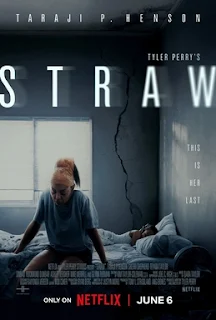TRASH IN MY EYE No. 29 of 2025 (No. 2035) by Leroy Douresseaux
Straw (2025)
Running time: 105 minutes (1 hour, 45 minutes)
Rating: not rated by the MPA / TV-MA
WRITER/DIRECTOR: Tyler Perry
PRODUCERS: Tyler Perry, Angi Bones, and Tony L. Strickland
CINEMATOGRAPHER: Justyn Moro (D.o.P.)
EDITOR: Nick Coker
COMPOSER: Dara Taylor
DRAMA/CRIME
Starring: Taraji P. Henson, Sherri Shepherd, Teyana Taylor, Sinbad, Rockmond Dunbar, Ashley Versher, Mike Merrill, Glynn Turman, Shalet Monique, Diva Tyler, Derek Phillips, Tilky Jones, Katrina Nelson, Justin James Boykin, and Gabby Jackson
SUMMARY OF THE REVIEW:
-- Taraji P. Henson gives a tour-de-force performance in Straw, the third Tyler Perry film in which she has been the lead and her fourth Perry film, overall. It is a treat to watch so skilled and talented an actress in this film
-- However, as good as it is, Straw is very sad and mournful. Straw is not a tear-jerkier. It is a python of sadness that will squeeze the tears out of you, dear readers.
Straw is a 2025 psychological drama and crime film from writer-director Tyler Perry. The film is a “Netflix Original,” and it began streaming on the service June 6, 2025. Straw focuses on an African-American single mother who is forced by a series of unfortunate events into inadvertently taking hostages at a local bank branch.
Straw introduces Janiyah Wiltkinson (Taraji P. Henson). She is a single mother living in a dilapidated apartment with her frequently ill daughter, Aria (Gabby Jackson). Janiyah has been able to hold things together, but one particular day, everything starts to fall apart. Aria's school is demanding $40 for lunch money, and the landlord at her apartment complex is threatening to evict Janiyah if she does not come up with the rent money.
Janiyah's mean boss, Richard (Glynn Turman), at the “Super Center” grocery store is also threatening to fire her over being late for work and for often having to leave work early. Then, the unthinkable happens, and Janiyah finds herself at “Benevolent Bank & Trust,” where a misunderstanding becomes a major incident. Now, the bank's manager, Nicole Parker (Sherri Shepherd), and a female police detective, Detective Kay Raymond (Teyana Taylor), may be the only ones who can save Janiyah from more tragedy.
Straw is the fourth Tyler Perry in which actress Taraji P. Henson has appeared, and the third one in which she has been the lead. I have seen 2009's I Can Do Bad All By Myself, Henson's first starring role in a Perry film, but I have yet to see her second Perry lead, 2018's Acrimony. Straw is very different from I Can Do Bad All By Myself, which also has Henson play a desperate single mother, but that film was nowhere near as heavyhearted as Straw.
Straw is so gloomy and mournful that it would not be much of an exaggeration to say that I could cut the sadness with a knife and make sandwiches out of it. I don't want to spoil the film because as crazy as it seems that everything starts to fall apart for Janiyah on the same day, an even crazier or perhaps surreal ending to the film is in the works the entire time.
For all that is unbelievable about his film's plot, Tyler Perry has made Straw into a statement about and indictment of a system that makes it really expensive for poor African-American women to be poor. Henson, in another sterling performance, makes Perry's eccentricities in Straw convey both his melodramatic goals and socioeconomic messages. If people think a film like Straw is beneath Henson's talents, they would be wrong. The very least one can say is that Tyler Perry is not under-utilizing Taraji P. Henson's talents the way the broader... film industry is.
Once again, I can say of a Tyler Perry movie that there is nothing like Straw. It is one of Perry's better directorial efforts because for all its intensity, Straw's is less melodrama and more cinema verite-ish. Perry and Henson make me feel that Straw is reality and that its possibilities and speculations are realistic. Sure, the film doesn't so much as jerk the tears out of the viewer as it squeezes the tears out of the viewer. Still, Straw reveals that in the lives of certain Americans, the last straw really has many other straws coming behind it.
7 of 10
B+
★★★½ out of 4 stars
Sunday, July 6, 2025
The text is copyright © 2025 Leroy Douresseaux. All Rights Reserved. Contact this blog or site for reprint and syndication rights and fees.
-------------------
-------------------












